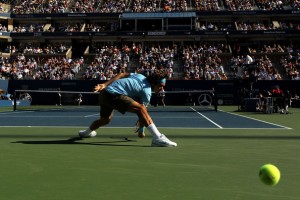In 2010 Roger Federer was defeated four times after holding matchpoint, an unhappy series of results that strikes many as another sure indicator of his accelerating decline. How accurate is this? The first thing to do is recall the matches (and the points) themselves. Briefly adumbrated, the details are thus:
 Indian Wells vs. Marcos Baghdatis, 7/5 5/7 6/7 (3 matchpoints)
Indian Wells vs. Marcos Baghdatis, 7/5 5/7 6/7 (3 matchpoints)- Miami vs. Tomas Berdych, 4/6 7/6 6/7 (1 matchpoint)
- US Open vs. Novak Djokovic, 7/5 1/6 7/5 2/6 5/7 (2 matchpoints)
- Paris Indoors vs. Gael Monfils, 6/7 7/6 6/7 (5 matchpoints)
It is tempting to search for a pattern here, a unifying reason to suggest what Federer is or isn’t doing at these crucial moments. The first thing we can say is that these were all matches at important tournaments, against quality opponents, and that Federer was a single point away from winning each of them. Federer is a glass-mostly-full kind of character, and seems to view it this way. The second thing to note is that all but one of these matchpoints are break points, and thus sit comfortably within the narrative concerning Federer’s general decline, which is something I’ve touched on before. (In case you’re curious, Federer’s break point conversion rate was 41% last year. In 2004, it was also 41%. It has never climbed higher than 44%, even in the years of his dominance.)
 The temptation is to view these four matches as related, as a series that can reliably tell us something about Federer’s form, or the way he approaches the crucial moments. The allure lies in the assumption that by analysing this pattern, the underlying issue can be isolated, and that it might then be dealt with. Is this assumption correct? Federer successfully closed out 65 matches last year. Over his career he has closed out 753 matches on the main tour. You’d have to think he’s pretty good at it by now. He knows what he’s doing. Against the four opponents with whom he had matchpoints but lost, he had a combined head-to-head of 29-6 heading in to those encounters. Excluding Djokovic, he was 19-1, while he had never lost to Djokovic in New York, and had beaten him just weeks before. The point is, he knew their games pretty well, and probably felt he had a decent handle on how to close out matches against them. He knew that each of these guys would hardly hold back at the key moments (excepting perhaps Monfils), but that the margins grow pretty small when it grows this tight. But shotmakers are shotmakers because they make shots, and while doing so grows much harder while down matchpoint against Federer, the chances of it happening are never going to be zero.
The temptation is to view these four matches as related, as a series that can reliably tell us something about Federer’s form, or the way he approaches the crucial moments. The allure lies in the assumption that by analysing this pattern, the underlying issue can be isolated, and that it might then be dealt with. Is this assumption correct? Federer successfully closed out 65 matches last year. Over his career he has closed out 753 matches on the main tour. You’d have to think he’s pretty good at it by now. He knows what he’s doing. Against the four opponents with whom he had matchpoints but lost, he had a combined head-to-head of 29-6 heading in to those encounters. Excluding Djokovic, he was 19-1, while he had never lost to Djokovic in New York, and had beaten him just weeks before. The point is, he knew their games pretty well, and probably felt he had a decent handle on how to close out matches against them. He knew that each of these guys would hardly hold back at the key moments (excepting perhaps Monfils), but that the margins grow pretty small when it grows this tight. But shotmakers are shotmakers because they make shots, and while doing so grows much harder while down matchpoint against Federer, the chances of it happening are never going to be zero.
It is not unlike Rafael Nadal’s improbable loss to Guillermo Garcia-Lopez in Bangkok last year, when the world No.1 came within a point of cruising to a routine win, 24 times. There was really little Nadal could take from it. He failed to break two dozen times in a single set, but few of the points were alike, and some of his attempted winners missed by inches, if that. Isner d. Mahut has proved that sometimes the seemingly impossible is merely the ridiculously improbable, that given an infinite number of monkeys, two of them would eventually go 70-68 at Wimbledon.
alike, and some of his attempted winners missed by inches, if that. Isner d. Mahut has proved that sometimes the seemingly impossible is merely the ridiculously improbable, that given an infinite number of monkeys, two of them would eventually go 70-68 at Wimbledon.
This is not to say that Federer haemorrhaging matchpoints is especially improbable, or that it tells us nothing about his year. The point is that, duly isolated, these results do not constitute a meaningful pattern, and won’t determine how he approaches these moments. After all, how many times last year did Federer win after blowing a matchpoint? How did Federer play on the matchpoints in all the matches that he won? Did he really approach these points differently five years ago? Personally, I don’t know the answers, but I’m not sure I need to. It is enough that Federer does. The answers are tangled up like Chistmas lights in the bramble of his mind, where – in a twinkle – they help him to decide how best to approach any given opponent at any given moment. It’s called experience, and while it might sometimes lead him into error, it wins him a lot more matchpoints than it loses.

One Response to Infinite Monkeys